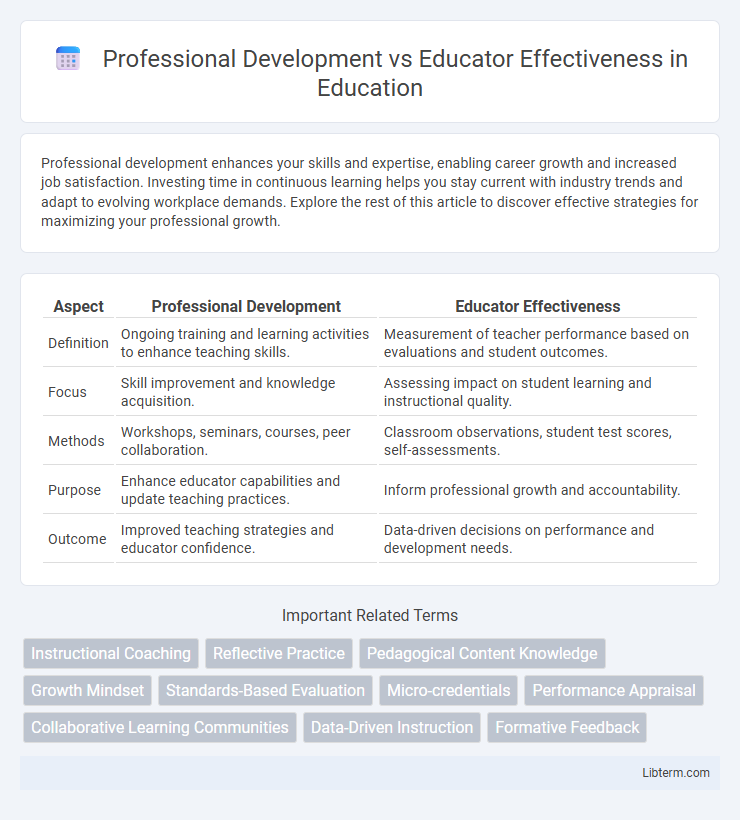Professional development enhances your skills and expertise, enabling career growth and increased job satisfaction. Investing time in continuous learning helps you stay current with industry trends and adapt to evolving workplace demands. Explore the rest of this article to discover effective strategies for maximizing your professional growth.
Table of Comparison
| Aspect | Professional Development | Educator Effectiveness |
|---|---|---|
| Definition | Ongoing training and learning activities to enhance teaching skills. | Measurement of teacher performance based on evaluations and student outcomes. |
| Focus | Skill improvement and knowledge acquisition. | Assessing impact on student learning and instructional quality. |
| Methods | Workshops, seminars, courses, peer collaboration. | Classroom observations, student test scores, self-assessments. |
| Purpose | Enhance educator capabilities and update teaching practices. | Inform professional growth and accountability. |
| Outcome | Improved teaching strategies and educator confidence. | Data-driven decisions on performance and development needs. |
Understanding Professional Development in Education
Professional development in education involves continuous training and learning opportunities designed to enhance educators' skills, knowledge, and instructional strategies, directly impacting student achievement and school performance. Effective professional development is research-based, ongoing, collaborative, and aligned with educational standards and goals to promote best teaching practices. Understanding this process helps schools create targeted programs that support teacher growth, improve educator effectiveness, and foster a culture of continuous improvement.
Defining Educator Effectiveness
Educator effectiveness measures how well teachers improve student learning, incorporating classroom performance, student outcomes, and professional growth metrics. Professional development supports educator effectiveness by providing targeted training and resources to enhance instructional skills. Effective educators demonstrate increased student engagement, higher achievement scores, and the ability to adapt teaching strategies to diverse learning needs.
Key Differences Between Professional Development and Educator Effectiveness
Professional development centers on ongoing learning opportunities for educators to enhance teaching skills, while educator effectiveness measures the impact of teaching practices on student outcomes using evaluation metrics. Professional development emphasizes skill acquisition and knowledge growth, whereas educator effectiveness focuses on accountability and performance assessment through observations and student achievement data. The key difference lies in professional development being a growth process, whereas educator effectiveness serves as a performance measurement system.
The Role of Professional Development in Shaping Educator Performance
Professional development plays a crucial role in shaping educator performance by providing ongoing training, updated instructional strategies, and reflective practices that enhance teaching quality. Targeted professional development initiatives improve educators' skills, boost student outcomes, and foster continuous growth aligned with assessment frameworks in educator effectiveness. Effective programs incorporate data-driven feedback and collaborative learning communities, ensuring educators adapt to educational standards and evolving classroom dynamics.
Measuring Educator Effectiveness: Key Metrics and Methods
Measuring educator effectiveness involves key metrics such as student achievement data, classroom observations, and teacher self-assessments to provide a comprehensive evaluation of teaching impact. Standardized test scores and student growth measures serve as quantitative indicators, while observation rubrics assess instructional practices and classroom management. These methods combine quantitative and qualitative data to support professional development tailored to improve teaching performance and student outcomes.
Impact of Ongoing Training on Teacher Outcomes
Ongoing professional development significantly enhances educator effectiveness by improving instructional skills, classroom management, and student engagement. Research shows that continuous training leads to higher teacher retention rates and better student achievement, demonstrating a direct impact on teacher outcomes. Effective programs emphasize practical strategies, collaborative learning, and alignment with educational standards to ensure sustained growth in teaching quality.
Bridging the Gap: Aligning Professional Development with Effectiveness Goals
Bridging the gap between professional development and educator effectiveness requires aligning training programs with measurable instructional goals, ensuring that teacher learning directly impacts student outcomes. Implementing data-driven professional development tailored to classroom challenges enhances educators' skills and promotes continuous growth, leading to improved teaching efficacy. Integrating feedback mechanisms and performance metrics creates a cohesive system where professional development supports district-wide effectiveness standards.
Challenges in Assessing Educator Effectiveness
Assessing educator effectiveness faces challenges such as subjective evaluations, inconsistent assessment criteria, and the difficulty of linking teacher performance directly to student outcomes. Professional development programs often struggle to address these gaps due to limited real-time feedback and the lack of comprehensive data systems. Accurate measurement requires combining multiple data sources, including classroom observations, student growth metrics, and peer reviews, while ensuring fairness and reliability in the evaluation process.
Innovative Approaches to Professional Growth for Educators
Innovative approaches to professional development emphasize personalized learning, integrating technology, and collaborative coaching to enhance educator effectiveness. Models such as micro-credentialing and gamified learning platforms foster continuous skill advancement tailored to individual teacher needs and classroom contexts. Research indicates these strategies improve instructional quality, boost educator engagement, and positively impact student outcomes in diverse educational settings.
Future Trends in Professional Development and Educator Effectiveness
Future trends in professional development emphasize personalized learning through AI-driven platforms and micro-credentialing, enabling educators to acquire targeted skills efficiently. Educator effectiveness will increasingly rely on real-time data analytics and adaptive feedback systems to tailor instructional strategies and improve student outcomes. Integration of virtual and augmented reality tools will further enhance experiential learning, fostering continuous growth aligned with evolving educational standards.
Professional Development Infographic

 libterm.com
libterm.com